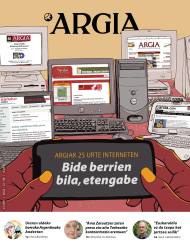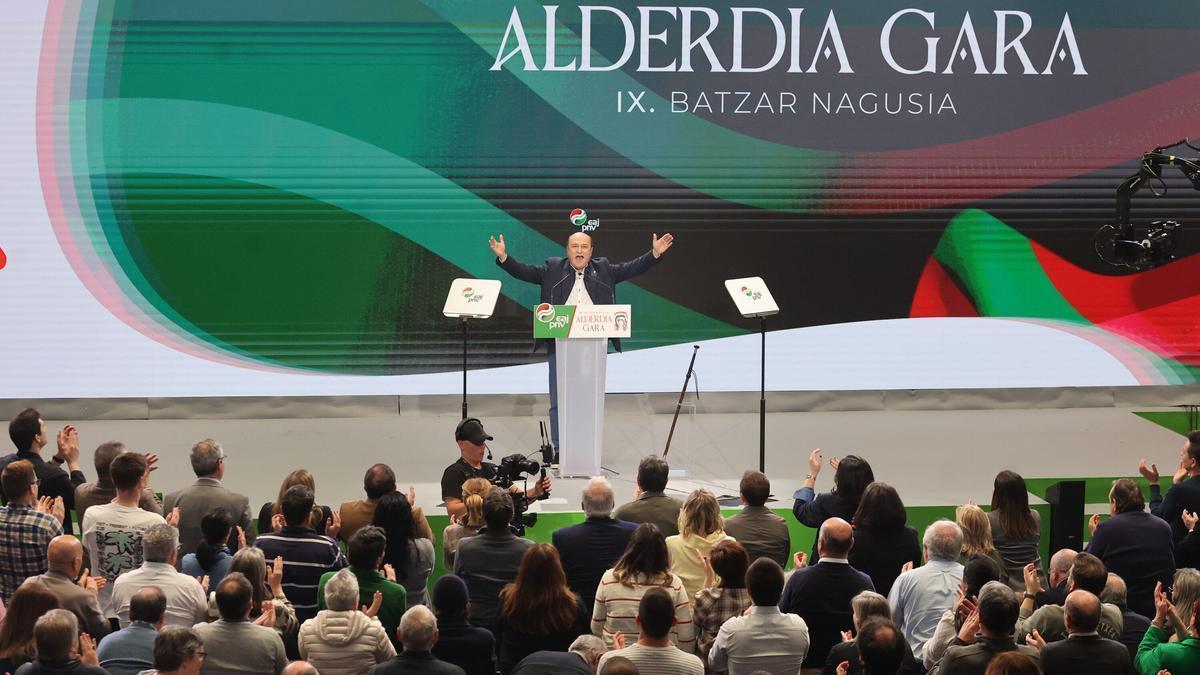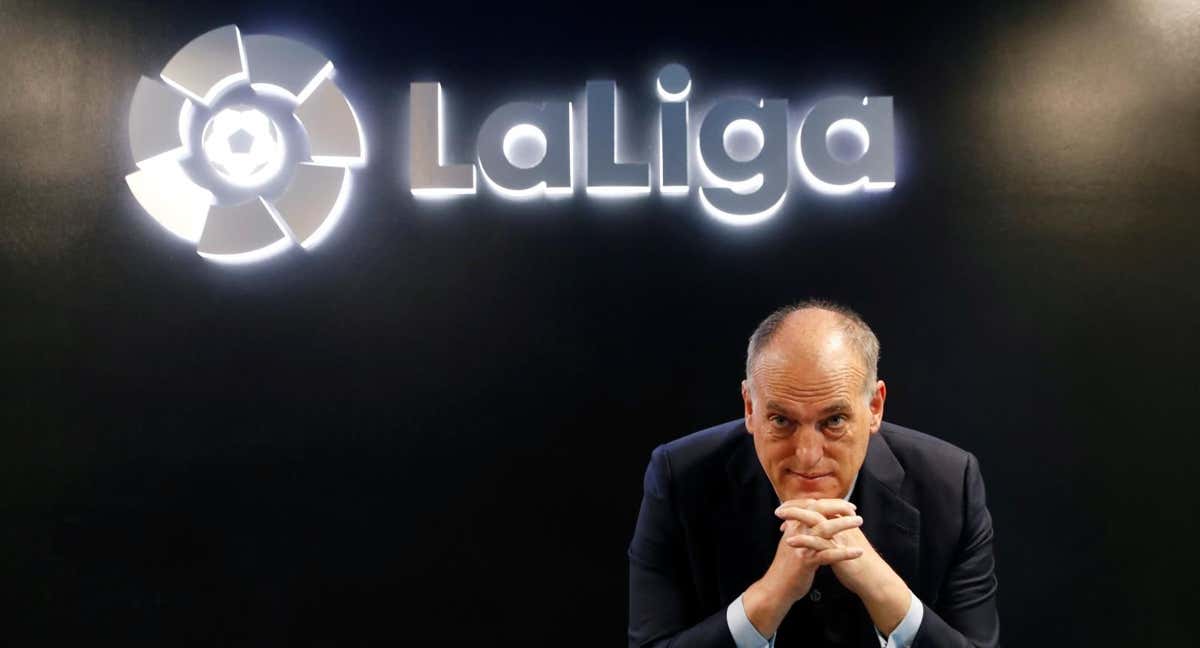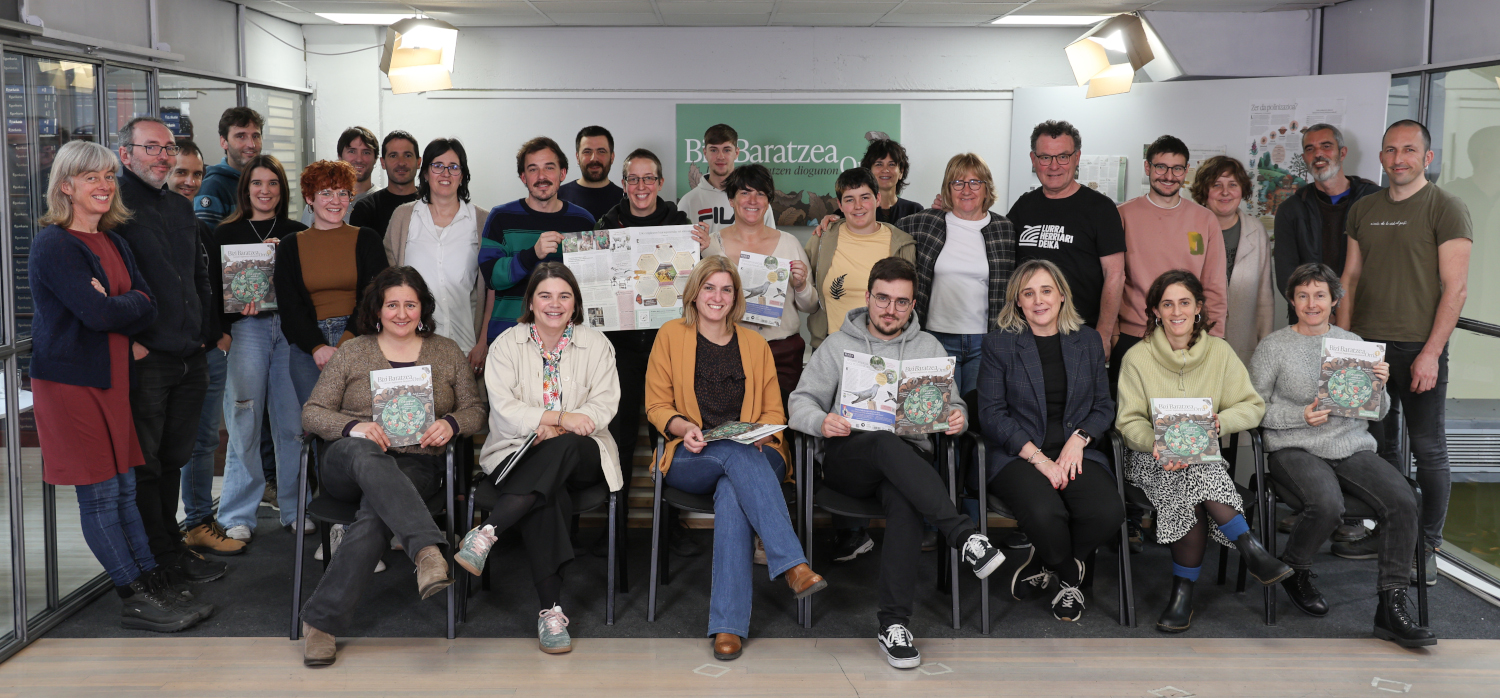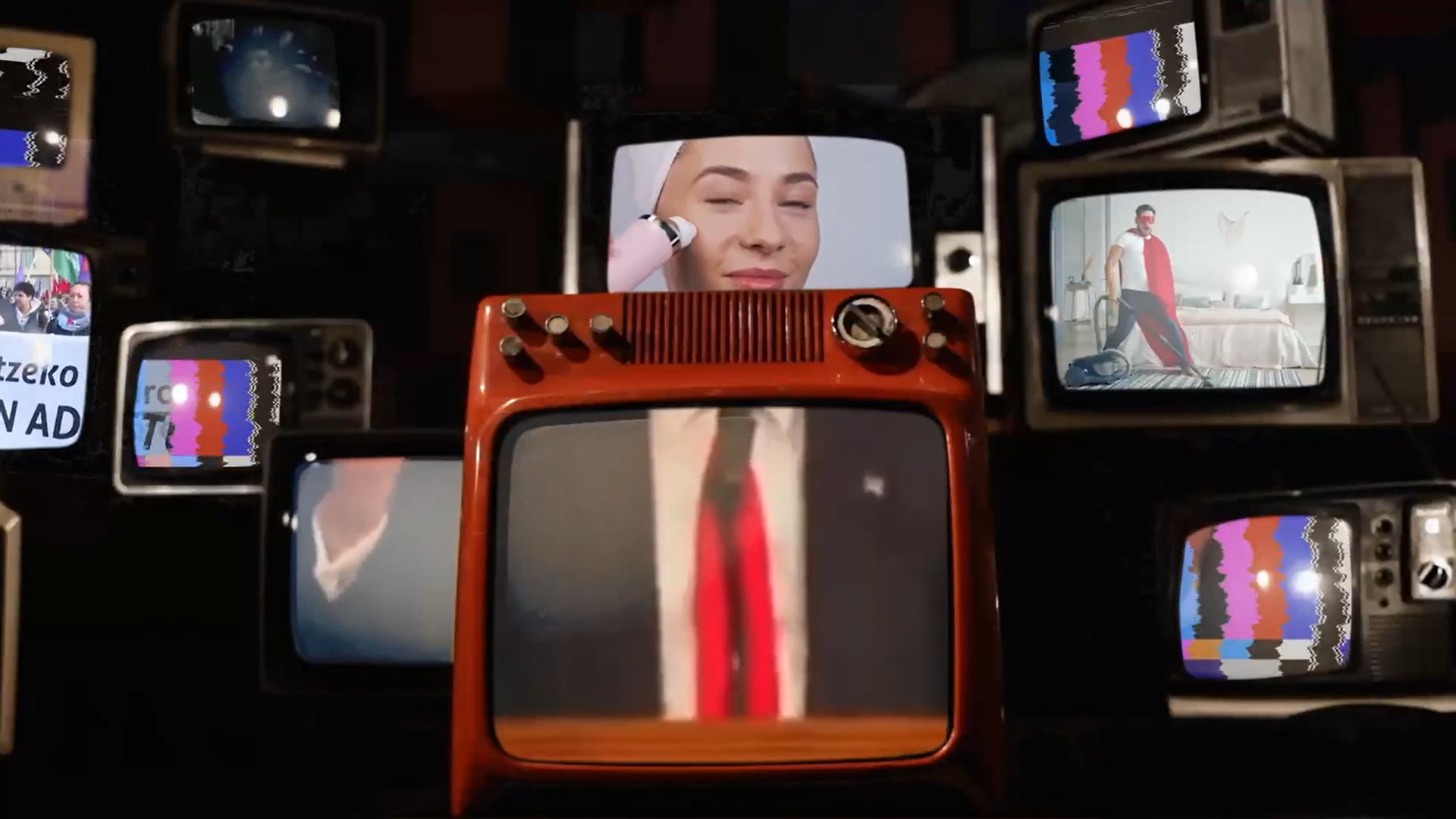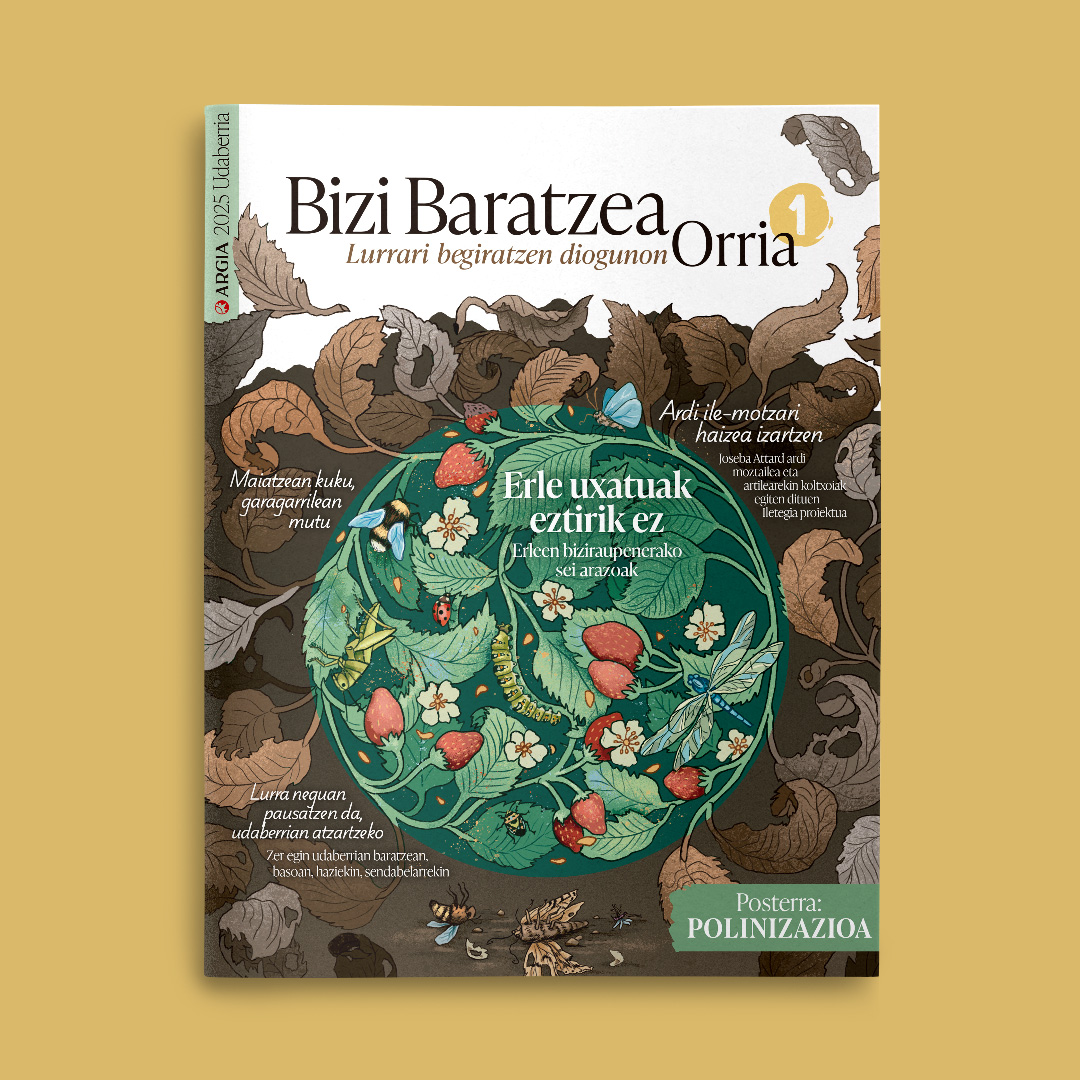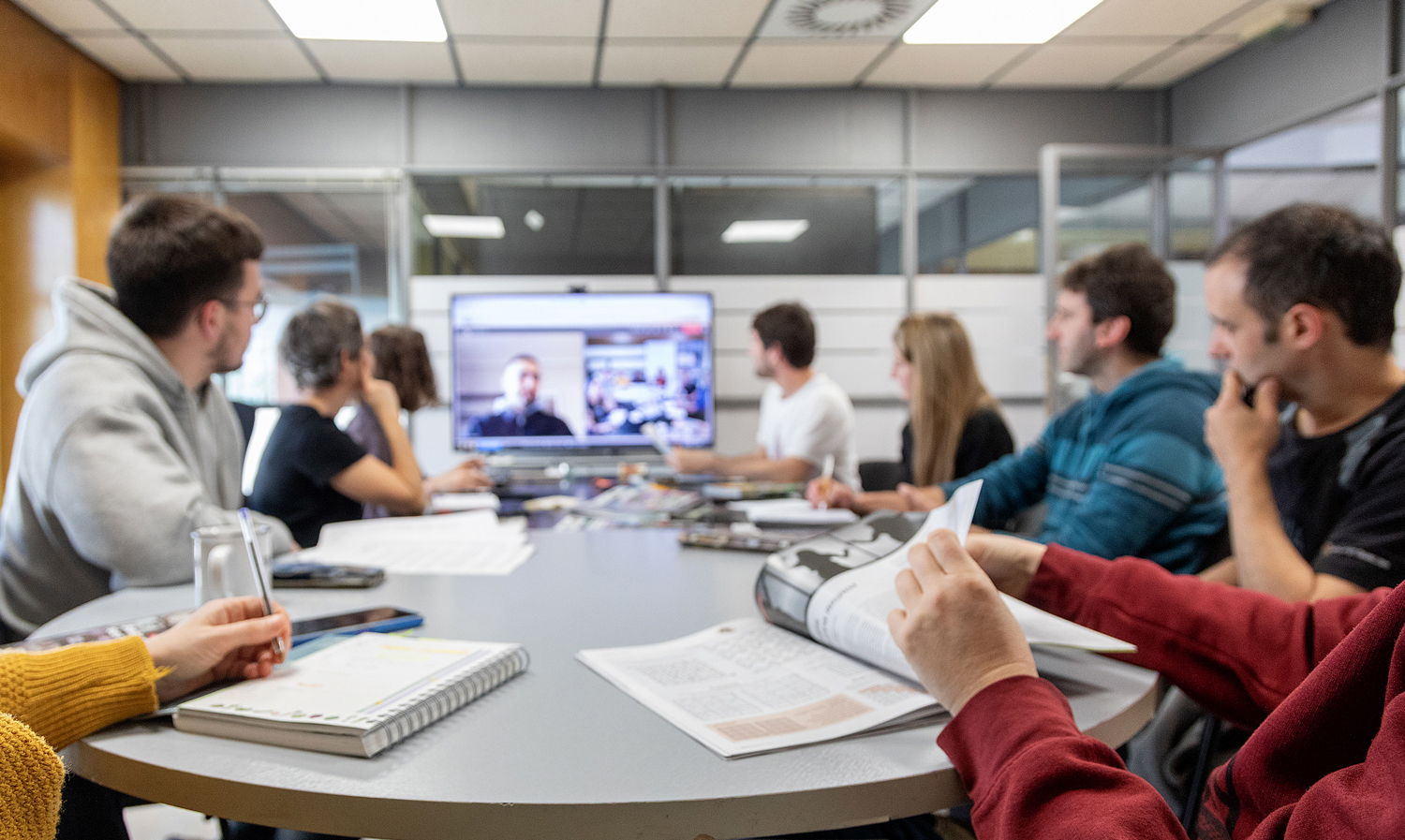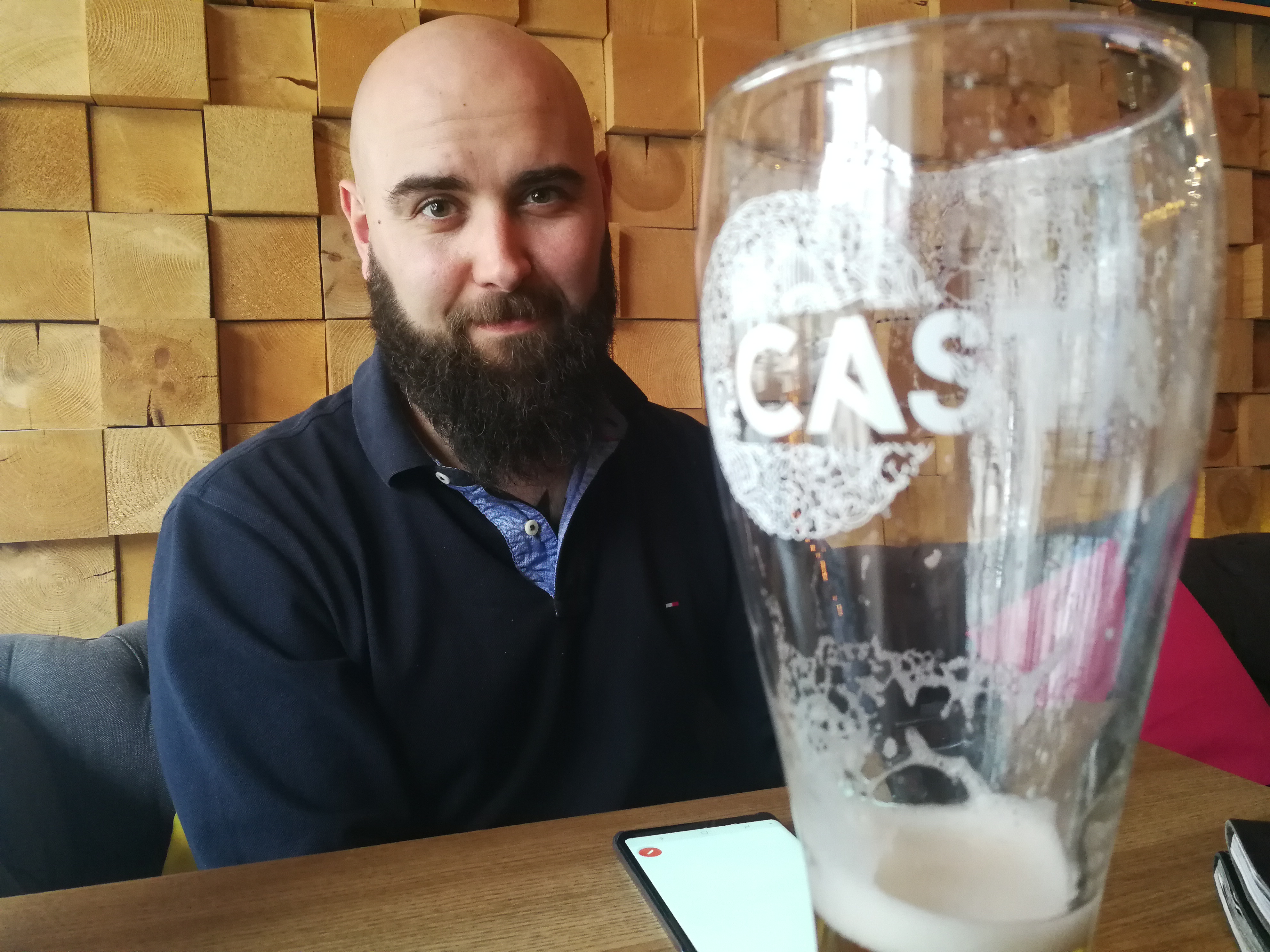Point by point, strengthening the network
- To influence the digital world, everyone plays their cards. You can lie, tell the truth, work alone without the protection of your partner or continue to work as a team. You can play big or small. Or with little letters, get the older one to stop too. ARGIA has been around this table game since it jumped on the Internet in 1997: without fear of exploring new paths and with the aim of disseminating the critical contents in Basque. This is thanks to the thousands of citizens who support the project.
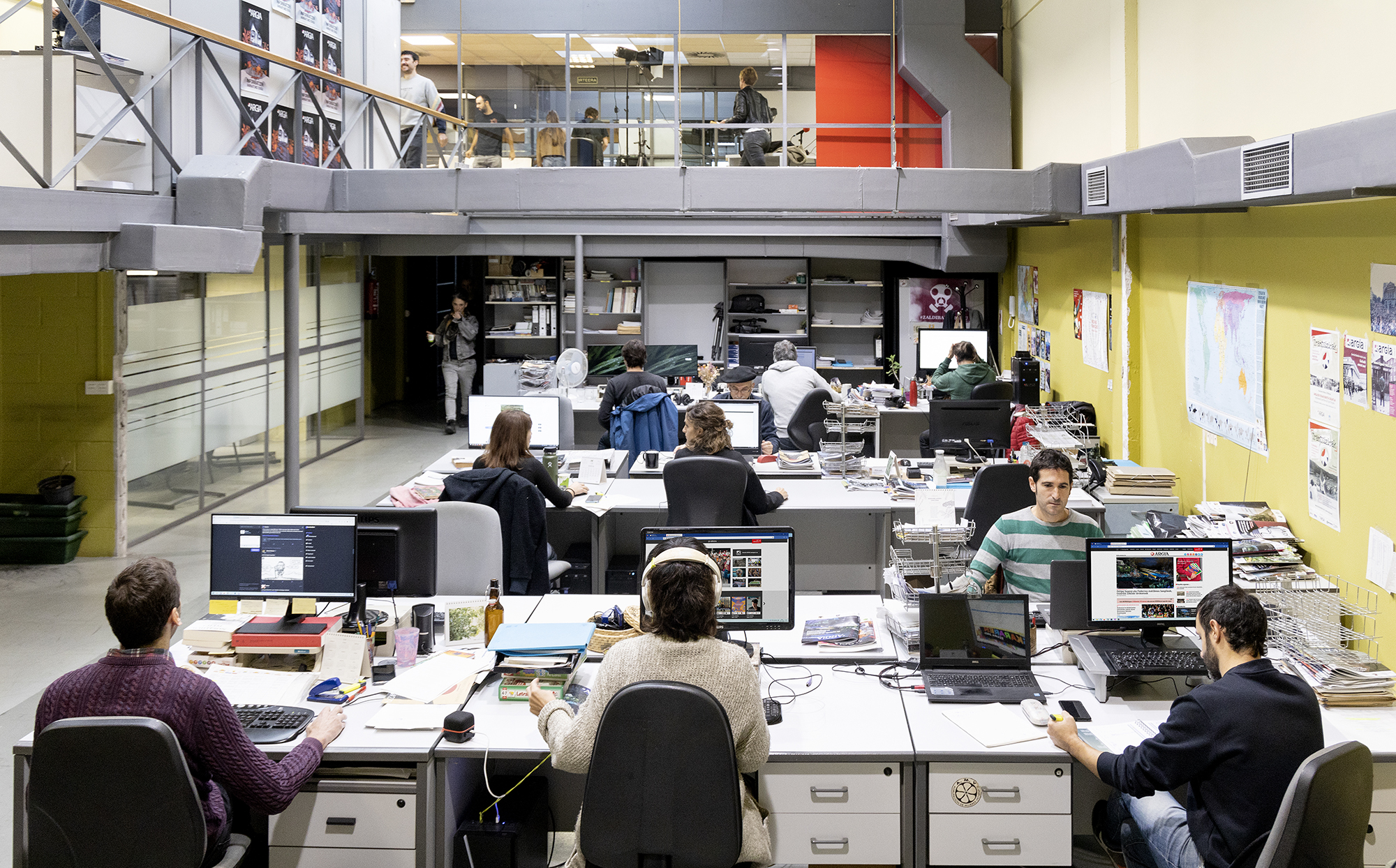
Twenty-five years have passed since we had the first opportunity to turn on the computer, pass the phone cable from one hole to another, dive into the Internet and enter the Red Light. Twenty-five years since the rules of the game were changed to do journalism. But what is that small group of ARGIA in today and what are their future challenges?
In a small culture, the Internet opened new avenues to influence a small group. There was a time, about ten years ago, with the creation of social networks, in which the small media showed up to the large in number of followers. It was amazing. A great opportunity. In these ten years, however, the wheel has continued to function and the institutions and powers have taken good care to provide certain means of financing and resources to re-impose themselves in the digital world. The party is still alive.
Just look a little bit on social media to see the power of the big ones, how they're organized, how they echo each other ... And it's hard to deal with. The ARGIA team is clear, as it is clear, but with good work it can gain essentiality and reach new followers, it can influence the digital world.
New webpage with
new year
The game field is Argia.eus. ARGIA is handling your letters here and then spreading them through social networks. The website turns 25 and, in addition to revitalizing, has also cleaned the casings. The decoration of the web realized for the ephemeris of the fourth century has been used to organize a more functional tool from the administrative point of view, somewhat obsolete. It has been prepared to work easily from mobile phones and, although on user paper, these devices have been taken into account.
.jpg)
ARGIA journalists are putting forces in the media. Over the past four or five years, they've focused a lot on podcasts, which is the current trend. Until then they had worked more in the style of video reporting, but the rhythm is intense and demands changes at all times, you have to look at where the game is played, not lose track of trends and try to find a space there. A plató has also been released with a radio programme recorded as audiovisual Sponnea Ta Natural, and new projects are being prepared for the future for the coming months. The success of the ARGIA strategic Bizi Baratze project aims, among other things, to adapt it to this format.
Change is constant and easy to stay behind the Internet. Without ceasing many things to the one covered, the objective is to identify the strongest points, from there and in the way, to do clean things, to innovate as much as possible and not to compare with visits and followers, to focus on that efficiency.
ARGIA generates a lot of content, both for paper and for the web, and it has to optimize this energy, “take advantage” of what it does, to continue offering critical products to the citizen in multiple formats. The members of the work team focus on feeding the journal, internet and multimedia more. Everything is a common project and joint work can serve another, if synergies are improved and projects are designed in a comprehensive way. Far from the fears they had about duplicity when they started working on the Internet, today they not only adapt a paper report to the network, but also use it, for example, to do an interview or a report for the weekly podcast, to add information, to give other references, to have time for improvisation ... And vice versa, they also adapt for paper jobs created for multimedia.
Editing system, current sieve
As in these 25 years the Internet itself has changed drastically, the ways of acting in it have developed, and ARGIA journalists have made the last change, since October have launched a new publishing system in the organization of the daily work of the web, the result of a process of reflection. According to the statistics provided by the Matomo application, the number of visits has increased since then to triple in several days.
Although they have the same trunk, paper and network are two branches that work together entirely but differently. Argia.eus has become a digital journal that focuses on everyday life. More than 4,000 people receive, in newsletter format, the result of this daily work: more than twenty news and references in Basque. It is one of ARGIA’s most strategic digital tools, along with the e-newsletter Bizi Baratze, which receives more than 7,000 people every week. But how is that work organized inside the house? Until yesterday, all journalists have participated as web leaders and in the production of information through a rotation system. One day a week adapted to each. Everyone participates in this work, but the web is the responsibility of some collaborators and the way to organize is another: the thematic working groups in writing (politics, environment, economy, social affairs, education, health, culture, Euskera, feminism…) have a greater weight in the screening of today, acting with the greatest possible foresight, both in the drafting of these contents and in the monitoring.
How are these papers distributed? Every morning the participants in the current screening, the representatives of the thematic working groups and those responsible for ordering, organizing, adequately disseminating the content and making the puzzle of all the web content meet. Thus, among all, a forecast of the current and the coming days is made and the works are distributed. Thus, they have ensured that the website is the result of what was agreed by consensus by the editorial board, that on that day and later it is the one available on the website, that on that day or week the citizen is counted, debated and agreed with criteria specific to ARGIA.
Actuality is subjective, who wants to tell what is considered. ARGIA has its own agenda, giving space to what is important to him, passing a filter according to his criteria and sources. And the goal is for a journalist who specialises in the matter to tell him the most rigorous, comprehensive and high-quality information possible. Today it continues tomorrow and the past and it collects in a more paused and quiet way different reactions, opinions and voices. All this combined with a weekly magazine reaching thousands of households.
Possibility of falls in the speed network
The network brings us fast and tighter. ARGIA also had the risk of falling into speed competition, “fifteen better than five.” Social networks lead us in August, but in this world there is another that thanks a little for the contents. It is one of the strengths of ARGIA, so for a long time it has focused on long-breathing journalism, creating content to listen, read and see calmly.
You should have your feet on the ground and think well about what you want to offer people. Do not forget, among other things, that you continue to be confident, that you work the content that is worth it, and if you fall into the vicious circle of speed you will also take your followers to that.
Before you get into some fashion, the question should be: Does it serve us to disseminate our content and values?
It is noted in the result. ARGIA wants to make a high-quality press, and to do so, without neglecting the most important news of the last hour, prefers to keep track of the present day without falling into the dictatorship of the last hour, analyzing the different edges, gathering the opinions of experts on the subject and producing deeper reports.
Nor-Nori-Nork
It seems that on the Internet we all start from scratch. We are all the same. That according to our merits we will get more or less followers. But the game doesn't have just that rule. Who is behind the Internet and who decides who to teach and in what order? Ditxosal algorithms. Locating yourself there isn't that easy, because on many platforms you don't have control of your content, and even if you create ordered content, another hand decides to take you to the front line or to the tenth.

To understand it better, an example: Did you remember how Facebook initially worked? I had 50 people -- to put a figure -- or nice pages. When they published something, it appeared on their wall chronologically and descending, from the most recent to the oldest. Today, it's the same platform that decides "what interests you" to see you through algorithms, and it's showing you a little bit of publicity, a piece of news released a week ago by ARGIA and a photograph that a friend hangs five minutes ago. Therefore, all ARGIA followers received what was being published throughout the day and received an echo, some reactions, dissemination of content. On the contrary, today, with almost 28,000 followers, even though some news is spreading dramatically, others published do not like to receive any. Did none of the 28,000 like the published? Or has many not appeared?
Peertube, Mastodon... looking for new ways
The big ones on the Internet are no longer just media, the platforms are powerful monsters, and this world of information forces you to be attentive and find new ways. Telegram and Mastodon work a lot because ARGIA currently has more or less control of its content on these platforms. To hang videos like Peertube. On the road to technological sovereignty, it is important that everyone has their own servers, not only as a political decision or as a philosophy, but also in practice realizes that they are sold differently in the face of cyber-attacks.
Argia.eus renewed with the new year
[Lander Arbelaiitz Mitxelena] We have been working on renewal for months ARGIA.eus and we are finalizing the touches to present them as quickly as possible.
As explained in this report, the ARGIA website is 25 years old and, although it is not seen, the interior administrative space is built overlaying the patches. At first, the interviews were digitized, then the weekly reports, then the news, the newspaper library, the multimedia channel, the blogs, the tags, the online fair… The tripas of the ARGIA web are the X-rays of the moment each section was performed – today we have 120,000 indexed articles and it is a project of the near future to offer all the same until 1919 – and we saw the need to adapt to the new times.
Be able to update a story on the street with your phone or make a photo and create news from it. This was the starting point for this renewal approximately a year ago, so although it will be invisible to users, the change in the administrative space of the tool we work with is very important. We hope that the more modern the instruments are, the better the result of the work.
However, we wanted to take advantage of the 25th anniversary to renew the public part of the website. The main objective will be to organise, prioritize and better present the information. We leave aside the scheme of the two main vertical columns of Argia.eus and from now on we join the trend that has prevailed worldwide: we classify the information by more horizontal blocks. Among others, it is much more appropriate for mobile devices.
Multimedia will also receive a boost and, in addition to podcasts, audiovisual production will have a prominent place, in which we intend to continue to offer and encourage information.
We will also refine the design to make navigation more enjoyable among so many items. And seeing thousands of people access ARGIA on a daily basis via cell phones, we will also renew the mobile version of our website. The presentation will be on 10 January, and once completed, we already have more strong projects that we want to carry out next year.
In recent months Argia.eus the number of visits by Internet users has doubled, and we believe that the renewal of the cover will help to give an elegant welcome to our website visitors.
However, ARGIA is in the experimentation phase of the network, as it has always been. He knows that many of the platforms are multinational and that if these issues are ever closed, he may lose what is there, but he does not want to give up visibility and the people of the network. It's finding its space, and it also wants to take advantage of those spaces to make its contents known, to open new paths without stopping in a comfortable place.
Instead of getting into something because it’s “fashionable”, the question has to be: Does it serve us to disseminate our content and values? To do our journalism? If so, but maintaining the essence of ARGIA. Language is a question, not whether a social network is right or wrong. You have to get what you mean and your content incorporated there. For example, in the program of Bertso Txapelketa Nagusia he jumped from Tik to Toki. We're not going to see (hopefully) journalists in dance, they're going to use it as a channel for spreading the content they generate, for spreading journalism.
You just have to look on social media for the power of the big ones, how they're organized, how they echo each other.
The key is how to adapt formats. It doesn't mean that everything you create gets in the same format on all social media. Everyone has their own rules. Tik Tok or Instagram, for example, are places to upload very short things, but you can take advantage of it to put small portions of a long prepared content and show the work of ARGIA. The important thing, because in the end it is to convey what is in essence.
Free content
That has been the case from the start. One of the doubts that emerged in 1997 was whether all the contents of the network should be free or not. The group unanimously decided that yes, that ours is a small culture, that we are working in Basque and that the aim is for our work to reach as many people as possible. After twenty-five years the goal remains the same and the decision within the home is firm. Today, despite the fact that many media outlets have chosen to place a lock or limit the contents, there are many means that implement the culture of free content advocated by ARGIA and influence by sharing them.
At ARGIA you can find all the free reports, interviews and contents for reading and dissemination under the Creative Commons-BY-SA free license. The multimedia channel also includes hundreds of documentaries, tertulias, short films and events in Basque. And if all this is possible, it is thanks to the thousands of citizens who support ARGIA economically. We will continue to strengthen, point by point, the network we want.
They had light.

1997 is the turning point of ARGIA. They go from doing the weekly just to feeding the Red Light. They're on the Internet. In a few years they enter a world capable of making things that were previously unthinkable, but gradually opening new windows. At the moment, they have hung the information they have digitized.
One of the first to make the leap to the ARGIA network in the field of Basque culture and Basque communication. The other was the Ttipi Ttapa channel. They had light, sight or luck.
However, in the case of ARGIA the wager with internet cannot be understood outside the logic of the business group Ametzagaiña. The computer cooperative Adur, the printing press Antza and ARGIA constituted in 1997 a non-profit entity in the legal form of an Economic Interest Group. The Interactive Iametza was later incorporated. What were the objectives of origin? Cooperation in the development of individual business activities, research and development of new technologies and development of new projects, taking advantage of existing synergies. The aim was, and remains, to meet the research and development needs of the three partner companies so that they could reach the technological level necessary to maintain and strengthen their original aspirations.
Use the pausing internet half part. In a group of technically highly qualified people, they could make this project possible, and ARGIA, without the support of the group, would have difficulties to walk that path to the digital world and lead the Basque Country.

History of ARGIA interviews
Some domestic work had already been done by 1997. Apparently, the printing press itself was largely linked to digitalization and with its help the collection of interviews conducted by ARGIA for years in CD-ROM format was completed. So when they prepared the web, they already had the first material to hang it at everyone's fingertips. From there, they started hanging some fragments of the weekly, which they could not put the entire magazine for a few months, then the contents of the yearbook, the news, the first multimedia works that arrived in 2007, the social networks, and the speed of light to this day.
Azken aldian, asteburuetan, Internet ez dabil ondo. Hasieran, zaila zen webguneei ezarritako blokeoen zergatia ulertzea; orain, badakigu Espainiako La Ligak agindu zituela, futbola modu ilegalean emititzea saihesteko. La Ligaren blokeoak euskal domeinuei eragiten dien... [+]
Gaur, martxoak 27, ARGIA komunikabidearen egoitzan aurkeztu dugu Bizi Baratzea Orria, urtaro bakoitzean zabalduko den aldizkari berria. Horrekin batera ospatu dugu ARGIAren Bizi Baratzea proiektuak 10 urte betetzen dituela aurten. Bizi Baratzeako kolaboratzaileak eta ARGIAko... [+]
Martxoaren 14an Donald Trumpek agindu exekutibo bat sinatu zuen, hainbat berri agentziak jasotzen duten diru kopurua asko murrizteko. Kaltetuetako bat United States Agency for Global Media (USAGM) izan zen eta, ondorioz, Voice of America (VOA), Radio Free Europe/Radio Liberty... [+]
Nortasuna Sarean jardunaldien 10. edizioa egingo dute asteazken honetan Donostiako San Telmon, KomunikaziONA bideguruatzean izenburupean. Egungo komunikazio joerak aztertu eta "alternatiba osasuntsuagoak" topatzen saiatuko dira. Hainbat hizlari gonbidatu dituzte, euren... [+]
Urtaro bakoitzean kaleratuko den aldizkari honek Lurrari buruzko jakintza praktikoa eta gaurkotasuneko gaiak jorratuko ditu. Formato oso berezia du: plegatutako orri handi bat da eta zabaldu ahala poster handi bat agertuko zaigu barnean. ARGIAk sostengatzen du Bizi Baratzea... [+]
2022ko ekainaren 7an, Directa-k serie luze bateko lehen polizia infiltratuaren kasua argitaratu zuen. Martxoaren 5ean, Belen Hammad fikziozko izena erreta geratu zen, polizia-argotean dioten bezala. Jada hamar dira Directa, El Salto eta El Diario-k azken hiru urteetan argitara... [+]
USAIDen inguruko txolopotearen ondoren, espero beharrekoa zen. Baina, hala ere, urte askotan haien jarraitzaileak izan garenok, samin-puntu batekin hartu dugu albistea. Martxoaren 15ean, Trump administrazioak, kolpetik, erabat itxi baitu United States Agency for Global Media... [+]
Sare sozialetan badira zenbait pertsona eragin gaitasun handikoak. Jarraitzaile ugari dute, eta euren iritziak egiatzat hartzen dira. Askok, ordea, egia barik, interes propioa edo klase baten interesak iraunkortzea bilatzen dute. Ameriketan komentokrata deitzen zaie. Alegia,... [+]
Varsoviako Barrutiko Auzitegiak argudiatu du González jada ez dagoela Polonian, eta ezin dutela jakin noiz aterako den Errusiatik. Auzitegiak ez du kazetari nabarniztarraren aurkako bestelako prodezurarik abian jarriko.









